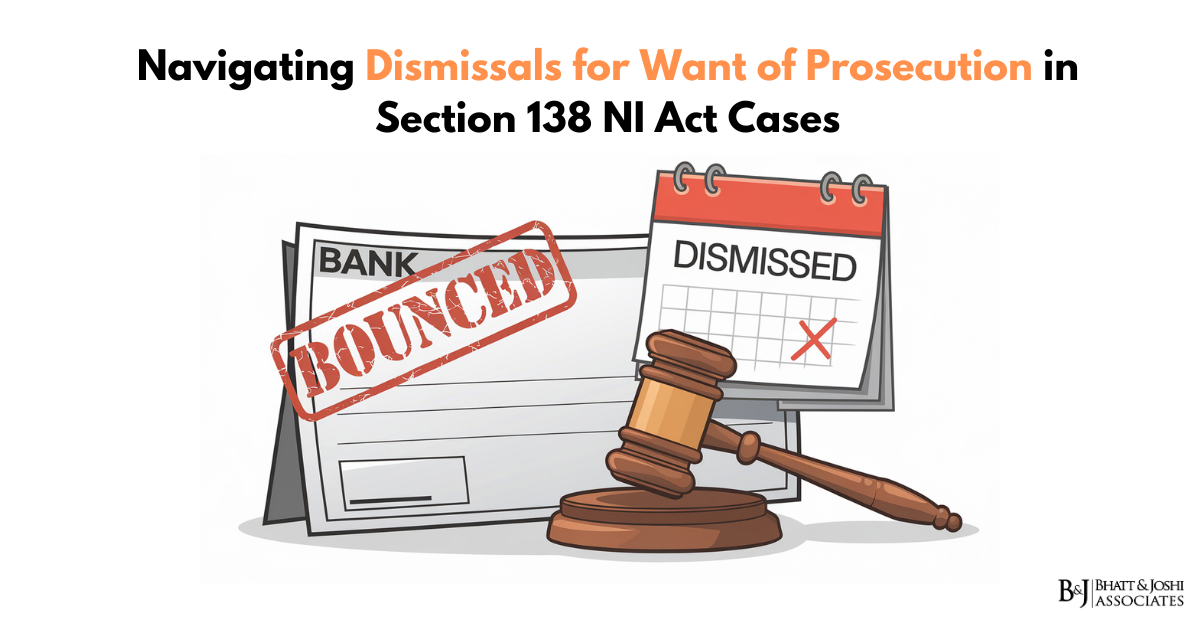Navigating Dismissal for Want of Prosecution in Section 138 NI Act Cases
Understanding the Implications of Dismissal for Want of Prosecution
In the realm of criminal law, particularly under the Negotiable Instruments Act (NI Act), a dismissal for want of prosecution can have significant consequences. When a complaint under Section 138 is dismissed due to the absence of the complainant, it not only brings the proceedings to an abrupt halt but also results in the acquittal of the accused. This article explores the legal framework surrounding such dismissals, the remedies available to complainants, and important considerations for legal practitioners.
The Legal Framework
Section 138 of the NI Act
Section 138 of the NI Act addresses the offense of dishonor of cheques. It provides a mechanism for complainants to seek redress when a cheque issued in discharge of a liability is returned unpaid. However, if a complainant fails to appear in court, the proceedings may be dismissed.
Dismissal for Want of Prosecution
Dismissal for want of prosecution typically occurs when neither the complainant nor their advocate is present during a scheduled hearing. Under Section 256 of the Code of Criminal Procedure (CrPC), if the complainant does not appear on the appointed day, the magistrate may acquit the accused unless there are compelling reasons to adjourn the hearing. This dismissal effectively ends any further action on the complaint.
Constitutional Considerations
The principle enshrined in Article 20(2) of the Constitution of India states that no person shall be prosecuted and punished for the same offense more than once. Consequently, once a complaint is dismissed and an acquittal is recorded, it becomes challenging to reinstate proceedings against the accused.
Remedies Available to Complainants
Filing an Appeal
When faced with a dismissal for want of prosecution, the primary remedy available to complainants is to file an appeal under Section 378(4) of the CrPC. This section allows a complainant to appeal against an order of acquittal passed due to dismissal. The High Court must grant special leave for such an appeal to proceed.
Key Points on Filing an Appeal:
- Grounds for Appeal: The appeal must clearly outline valid reasons for the absence during hearings and argue against the magistrate’s decision.
- Timeliness: Appeals should be filed promptly after receiving notice of dismissal to avoid complications related to delays.
Revision Applications: A Misguided Approach
Some legal practitioners may consider filing a revision application under Section 397 of the CrPC instead. However, this approach is generally not advisable because:
- Legal Precedence: The Bombay High Court has clarified that when an order of acquittal is passed under Section 256, the only remedy available is through appeal, not revision.
- Lack of Jurisdiction: Once an acquittal order is recorded, any subsequent attempts to restore proceedings or challenge that order through revision are likely to be deemed unauthorized.
Practical Considerations for Legal Practitioners
Importance of Attendance
Legal practitioners must emphasize diligent attendance at all hearings. If a genuine reason arises that prevents attendance, it should be communicated effectively to avoid dismissal.
Restoration Applications
In certain instances where dismissal occurs but has not yet been recorded officially, advocates may attempt oral requests to restore cases. However, once an order is recorded, any restoration attempts are futile and may lead to further complications.
Valid Grounds for Absence
Courts have shown willingness to restore complaints if valid reasons are provided for absence. Examples include:
- Mistakenly Noting Dates: If a complainant or their advocate misnotes a hearing date and can substantiate this error with evidence.
- Genuine Emergencies: Situations such as medical emergencies or unforeseen circumstances that prevent attendance can also serve as valid grounds.
Conclusion: Handling Dismissal for Want of Prosecution in Section 138 Cases
The dismissal of a Section 138 complaint due to want of prosecution poses significant challenges for complainants seeking justice in cases involving dishonored cheques. Understanding the legal framework surrounding such dismissals and knowing how to navigate available remedies is crucial for legal practitioners.
Ultimately, while appealing against an acquittal under Section 378(4) offers a viable path forward, it requires careful preparation and adherence to procedural norms. Legal professionals must remain vigilant about attendance at hearings and proactively manage communication with courts to mitigate risks associated with dismissals. By doing so, they can better serve their clients and uphold justice within this complex legal landscape.
 Whatsapp
Whatsapp


